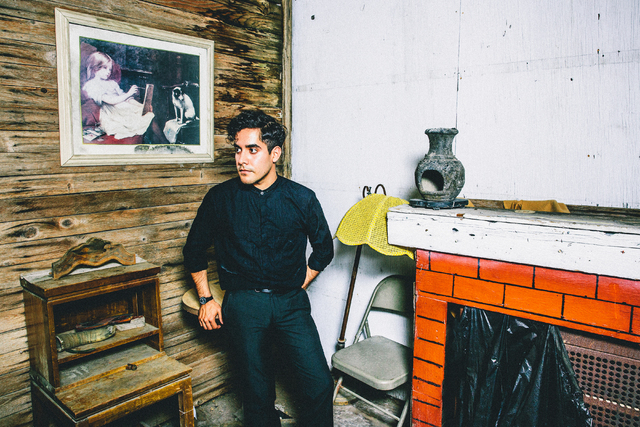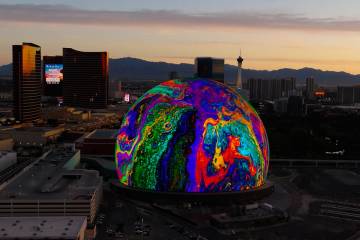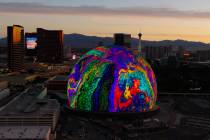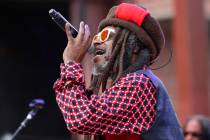Neon Indian’s Alan Palomo thinks like a movie director
Alan Palomo has the mind of a director.
“When I’m writing music, I’m always kind of seeing these little scenes play out,” the former film student says. “I think, for me, it’s absolutely important to feel like it could be a soundtrack to something.”
This notion is readily reflected in the music Palomo makes as Neon Indian. All three of the act’s albums play like a pastiche from his 20s, a pivotal period in anyone’s life.
“The narrative of Neon Indian isn’t so much focused on: ‘They had six weeks to make a record, and they went to this studio and worked with this guy,’ ” Palomo explains in his best movie trailer voice.
“You know, a lot of amazing records get made that way, but it’s just not what it’s about, for me at least. It’s more just about the project and the set of circumstances that it was birthed around.”
Of its three albums, Neon Indian’s latest, “Vega Intl. Night School,” probably has the most stirring storyline, in terms of how it came into being — or almost didn’t, rather. In a tale that’s been told often at this point, sometime after Palomo was wrapping his tour in support of “Era Extrana,” his band’s second album, he had a laptop lifted from him containing two hours of demos, stolen while he slept on a stoop in New York City.
It happened after a show at a club called Terminal 5. Palomo had headed home only to realize that he’d been locked out of his apartment, “and in kind of this drunken stupor determining what to do next,” he recalls, “I just kind of hung out there for a minute and nodded off. When I woke back up, somebody had swiped the computer.”
Palomo pins the pilferage on himself. While it eventually dawned on him how daunting the prospect was of losing that much music and having to start over, he tried to keep a positive perspective. “I was just sort of weirdly Zen about it,” he remembers. “And I think it was my own coping mechanism, just kind of doing these mental gymnastics to tell myself like, ‘Oh, well, maybe it was for the best.’ ”
He was able to reconstruct a pair of songs — one from memory and one pieced together from YouTube footage of him DJing a demo, something he didn’t typically do — but everything else was a complete loss. Turns out, though, the misdeed actually ended up sparking his creativity, inspiring him to entertain an entirely new set of influences. After the tour ended, he had returned home to Texas and landed a DJ residency.
“Back then, I was voraciously collecting records because it was the only way that you could have a new repertoire to play every week,” Palomo says. “You know, so that was a pretty influential time, in terms of discovering new music. I hadn’t had much of a return to that between the two first records. I was still just kind of writing music based off the perceptions that I already had of music and wasn’t really looking for anything new. And when I started DJing, I realized that I was, little by little, kind of rebuilding a blueprint for what this next record was going to be. And I needed a new set of influences to really not feel redundant and like I was treading the same old ground, which is kind of something that I very deliberately have tried not to do.”
When he was ready to make music again, he had more than enough ideas to start making something compelling. “Vega Intl. Night School” has been praised as Neon Indian’s best release yet, and there’s a reason for that. The circumstances surrounding this record were completely different from the past two.
“Psychic Chasms,” Neon Indian’s debut, for instance, was written in what Palomo describes as a kind of awkward transitional time. He had moved to Austin, where he hadn’t really established a network of friends yet and didn’t have a car. “The record felt like a bit of a soundtrack to that, you know,” he says. The awkwardness carried over on the next record, “Era Extrana,” which Palomo worked on abroad.
“That record was kind of made … it was very Led Zeppelin style, in the sense that it was made in transit. It wasn’t … the experience itself, I wouldn’t call it overtly negative, but it was really f——- stressful. When I think about that record, I think about the growing pains between making music as a hobbyist and making it as a vocationist and for the first time being like: Oh s—-, there’s, like, a team of people I have to kind of answer to, who are kind of expecting it by a certain time, and I’ve never had to make art under that set of circumstances. Am I even capable of doing that?”
On “Vega Intl. Night School” — which Palomo made with the help of his brother and a parade of players performing a plethora of instruments, all captured in a collection of sessions at places like DFA’s Plantain Studios — you can tell that Palomo took plenty of time putting all the pieces together. By the time he finished, he says, he had an abundance of material, unlike previous efforts.
“They say that a lot of films happen in the editing room, and this one would very much so be that kind of thing,” he says. “Typically, the way that the first two played out, is that I’d write enough content to feel like it’s a complete, cohesive record. ‘OK, cool, 11 songs. This sounds about right.’ And then I put that out. But with this one it was really just more of writing to an excess degree where I just had a surplus that I could then start whittling down.”
But it was not just paring down the parts, then it was also compositing. Palomo, who points to albums like “Donuts” by J Dilla, “Since I Left You” by Avalanches, and “Midnite Vultures” by Beck as influences, says the album was intended to be a bit of a collage of sounds. “I just wanted to write in these certain styles that, to me, had certain thematic links,” Palomo says, “or that felt like they could work together in some sort of goofy way,” a way that, beyond that, was also evocative of this era in his life.
“I kind of wanted to make my own cartoonish reimagining of what my time in New York has been,” he reveals. “if I couldn’t do it in film, then I would make it in a record.
“New York City is place that gets mythologized by a lot of filmmakers, and everybody kind of has their own interpretation of it,” he goes on, offering up a laundry list of films such as “Blue in the Face,” “Do the Right Thing,” “King of New York,” and “there’s all these ways to reimagine New York as a place, whether it’s like this successful metropolis or just like a complete f——-up dystopia.”
Executing this sort of envisage took some time, as evidenced by the four years that passed between the release of “Era Extrana” and “Vega Intl. Night School.” While the pressing passage occasionally gave Palomo pause, ultimately it’s how he’d prefer to make music. “Obviously, it wasn’t an easy record to write, but I definitely did take my time,” he acknowledges. “There were very few moments where I didn’t feel like I was having fun. Because I felt like it was essential to be like, ‘Well, if you’re still going to make music, then it needs to be fun. Otherwise, just go back to school. Do something else.’ ”
If this sort of thinking sounds counterintuitive to the way the things work nowadays days, well, that’s because it is. “I was glad that I stepped away from it, because the modern construct of the music industry where you’re just kind of the horse to bet on,” Palomo says, “I think it does a severe disservice to musicians, in the sense that records are becoming such ephemera.
“Like people listen to them for such short of time spans now and it’s so saturated, and the way that it works now is an album cycle is much shorter,” he continues. “You make the record, you tour it for 18 months until you can’t sell out the venues anymore, and then they expect you to go back in the studio, do it again in another six months, and then go back out there and do it again.
“I think, for me,” he concludes, “it was very important to not spend my 20s in a van, just staring out the window wishing I was in the studio.”
It is, after all, the story of his life.
Read more from Dave Herrera at reviewjournal.com. Contact him at dherrera@reviewjournal.com and follow @rjmusicdh on Twitter.
Neon Indian at Neon Reverb
12 a.m. Friday
Fremont Country Club, 601 Fremont Street
$15-$50 (weekend pass) neonreverb.com




























